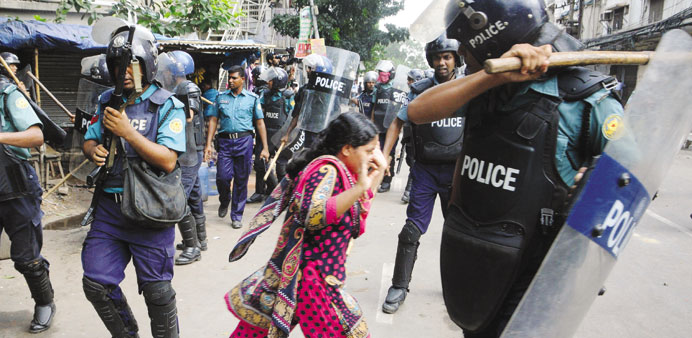Clashes as garment workers protest
Bangladesh police yesterday fired rubber bullets and tear gas at thousands of garment workers protesting for better benefits in the capital Dhaka.
The clashes occurred in Dhaka’s Tejgaon industrial area after about 5,000 workers from Utah Fashions went on the rampage when they found the owners had closed the factory rejecting their demand for a hike in lunch and attendance bills.
“They staged a sit-in blocking a road. The factory management and police have asked the workers to clear the road. But they became unruly and smashed vehicles and factory windows,” local police chief Monir Uz Zaman said.
The protesters were dispersed after “police fired rubber bullets and tear gas at them,” Zaman said, adding several people were injured.
Police in Dhaka Medical College Hospital said at least one worker was brought into the hospital with injuries from a rubber bullet.
In a separate but similar incident in Gazipur district north of Dhaka, up to 2,000 workers from the Uni Gears factory clashed with police after the authorities shut the plant indefinitely.
“The workers blocked a key highway and threw stones at police. We fired tear gas to disperse them,” Gazipur police spokesman Mosharraf Hossain said.
Hossain said the owners closed the plant following days of protests by the workers demanding increases in perks and bonuses.
Bangladesh’s $20bn garment industry, the world’s second largest after China, has witnessed weeks of labour protests over pay hikes and better safety since a massive building collapse killed 1,129 factory workers outside Dhaka in April.
The government last month set up a panel to raise the minimum wage for millions of garment workers, as tens of thousands walked out of their factories and fought street battles with police.
A series of tragedies since November have highlighted appalling safety conditions in Bangladesh’s 4,500 garment factories and triggered renewed scrutiny of “made-in-Bangladesh” clothes commonly sold in the West.
Presse esclavagiste (Agence Faut Payer via Gulf-Times.com, 17 juin 2013)

